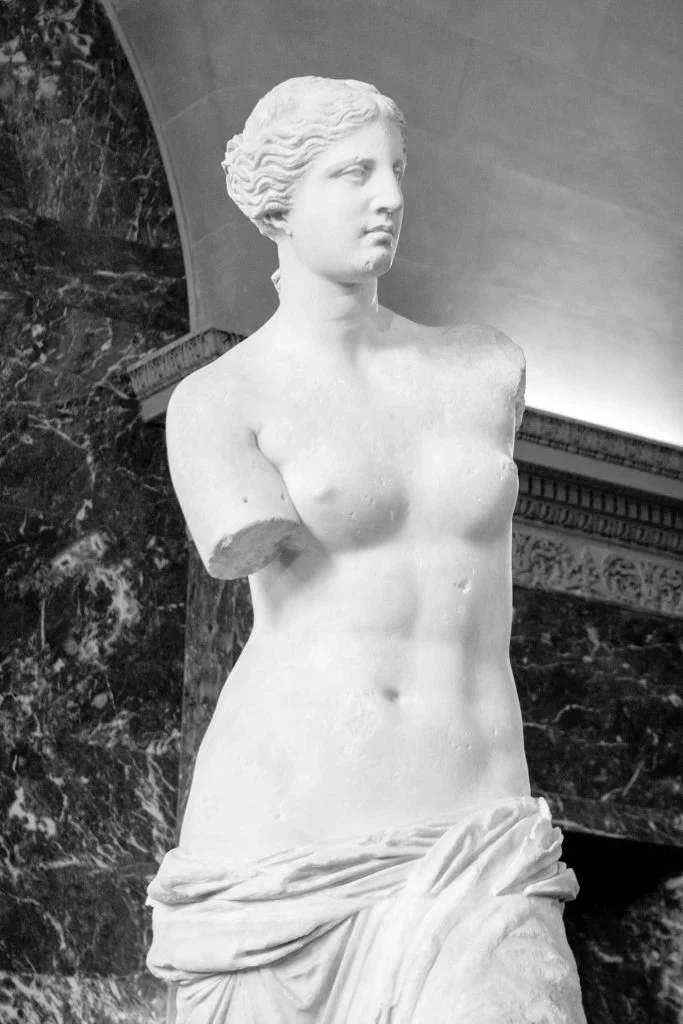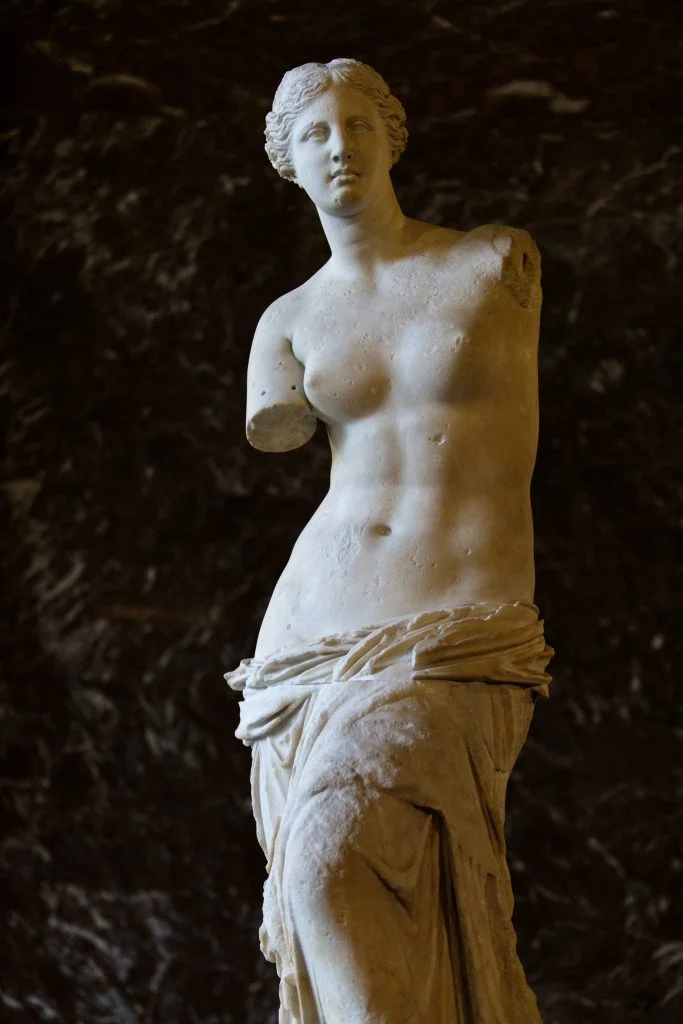Have you ever had a love affair with mythology? Well, I have, and it’s no secret that my heart (as a Greek) belongs to Aphrodite. I remember the first time I stumbled upon her story; it was like discovering a secret world where love reigned supreme. Now, I’m practically an honorary member of Olympus, or so I like to think! Have you ever wondered why roses are red or why doves coo? Spoiler alert: Aphrodite’s fingerprints are all over them.
Dive into my treasure trove of 50 Aphrodite facts – trust me, it’s juicier than the latest celebrity gossip. Ready to fall head over heels with knowledge?
In the gardens of Aphrodite, you’ll find the tender blooms of love and beauty, but beware the thorns of jealousy and vanity.
Unknown
Aphrodite Facts
The exploration of fun facts about Aphrodite, the enchanting goddess of love and beauty, begins now. As you unravel the mysteries of this goddess, prepare yourself for a quiz at the end of this article.
- The genesis of this goddess occurred amidst sea froth near Cyprus, following Cronus‘ act of casting Uranus’s severed parts into the sea.
- Hephaestus, the forge god, was her husband, though she rarely remained loyal to him.
- Swans drew her chariot across the sky.
- She owned an enchanting belt that compelled everyone to desperately desire the bearer.
- Her involvement in sparking the Trojan War came from promising Paris the most beautiful mortal.
- Known also as Cytherea and Cypris, these names refer to locales significant to her mythology.
- As Venus, her Roman incarnation, she represented a wider spectrum of beauty and affection, extending her patronage to agriculture and earthly delights.
- Her retribution could be fierce against those who defied or neglected her worship.
- In Sparta, she was revered as a militant deity.
- Notable for numerous affairs with gods and mortals alike, including Ares and Adonis.
- Among her offspring were Eros (Cupid), Phobos, Deimos, and Harmonia.
- She stands out as an Olympian who bore mortal children.
- The Venus de Milo statue is believed to depict her, epitomizing classical beauty.

- The Aphrodisia festival celebrated her with floral decorations and sweet incense at her shrines.
- Art often shows her ascending from the sea on a shell, fully mature, as in Botticelli’s renowned work.
- Doves, apples, swans, and roses are among her symbols, each embodying aspects of her essence and rule.
- Winning her favor could bring fortune or doom, heavily influenced by her mood and the homage paid to her.
- A sanctuary in Corinth, noted for its affluence and sacred courtesans, was dedicated to her.
- Many artworks depict her birth from the sea, alluding to her unique origin.
- The myrtle was sacred to her, emblematic of love and allure.
- She wielded the power to invoke love and aversion in gods and humans alike.
- The Golden Apple incident, leading to the Trojan conflict, began with her assurance to Paris.
- Her adoration involved fecundity ceremonies and safeguarding for mariners and combatants.
- Venus Anadyomene, an art theme, illustrates her emergence from the ocean, underscoring her maritime connections.
- Cyprus is celebrated as her birthplace and principal worship center.
- She could exhibit jealousy and spite, particularly towards those surpassing her in beauty.
- Her close bond with the Graces was marked, as they served her and symbolized the enchantment of allure.
- In the Iliad, she is depicted defending her son Aeneas in battle, showcasing her protective nature.

- Her binding with Ares, the god of war, symbolized the amalgamation of love and war.
- Adonis‘ tragic death by a boar, despite being her beloved, illustrates the transient nature of beauty and love.
- Legends hint at her as the progenitor of the Ichthyocentaurs, fish-people who aided her upon her emergence from the sea.
- Her cult was so significant that cities would engage in conflict for the privilege of her patronage.
- Her unparalleled charm was capable of causing instant infatuation in both gods and mortals.
- Described by Homer as ‘laughter-loving’, she reveled in the joys of affection.
- Her link to the Venus planet highlights her association with allure and charm, as Venus shines brightly after the moon.
- Her ability to alter her visage rendered her irresistible to anything she desired.
- A pivotal figure in various heroic legends, she often meddled in mortal lives for her purposes or to assist those she favored.
- Her temples were venues for artistic and lyrical expressions, celebrating life’s aesthetic and spiritual facets.
- She could grant marital bliss, and women would invoke her for a harmonious union.

- The Sirens, known for their deadly allure, were considered her disciples or daughters.
- For defying her divinity, she turned King Propoetus’s daughters into stone.
- Her role in the Golden Fleece saga underscores her influence on mythical quests and adventures.
- Though involved with many, she harbored a profound affection for Adonis, who met a tragic fate.
- The Gardens of Adonis were ephemeral gardens sown in her honor, symbolizing the fleeting nature of allure and life.
- Her retribution was feared, as evidenced by Hippolytus’s fate for spurning her rites.
- In the tale of Pygmalion and Galatea, her influence over themes of affection, artistry, and transformation is highlighted.
- Noted for her vanity, she tested Psyche to validate her devotion and loyalty to Eros.
- Her adoration might include rites of revival and rejuvenation, reflecting her ties to nature’s cycles.
- Copper, associated with the planet Venus, symbolizes her in alchemy, reflecting her impact on creativity and concord.
- Her influence extended beyond the realms of love and beauty, as she also protected sailors at sea, embodying the calm and tempest of the ocean’s moods.
Aphrodite Myths

After reading all these interesting facts about Aphrodite, now it’s time to separate the myth from reality. Is Aphrodite gentle and kind, or is this different from the truth? Let’s see.
- Aphrodite Was Only a Goddess of Love and Beauty
While Aphrodite is widely known as the goddess of love and beauty in Greek mythology, her influence extends beyond these realms. She also represented aspects of fertility and desire and even played a role in the celestial aspects of war and politics. - Aphrodite Was Always Gentle and Kind
Aphrodite, despite her association with love, didn’t always appear gentle and kind. She could be quite vengeful and manipulative, especially when scorned or in matters involving her favorites. Stories of her jealousy and the harsh punishments she dealt to those who crossed her path. - Aphrodite Was Born as a Fully Grown Woman from Sea Foam
The most popular myth of Aphrodite’s birth is that she arose from sea foam, fully grown, near the island of Cyprus. However, there are other less-known stories about her origins. In some versions, she is the daughter of Zeus and Dione, making her birth more traditional in the context of the Olympian gods. - Aphrodite Was Faithful to Hephaestus
Aphrodite, though married to Hephaestus, the god of craftsmanship, was notorious for her numerous affairs with gods and mortals alike. Her most famous affair was with Ares, the god of war. - Aphrodite’s Only Symbol Was the Dove
Aphrodite associated with a variety of other symbols, although the dove is one of her most recognized symbols. These include the rose, the sea, mirrors, swans, and even sparrows. Each symbol represented different facets of her powers and attributes, ranging from pure love to sensual desire.
No products found.
Aphrodite FAQ

Having journeyed through the swirling myths of Aphrodite, it’s now time to give answers to the most frequently asked questions about her online. Read carefully, because the quiz awaits you in the next section.
- Who are Aphrodite’s parents?
Aphrodite’s origins are quite a story! In one famous tale, she emerged from sea foam, born in a rather dramatic fashion from the ocean’s embrace, without traditional parents. But you’ll find another version where she’s the daughter of Zeus and Dione. Talk about having a complicated family tree! - What are the characteristics of Aphrodite?
She’s the epitome of beauty and charm. Imagine someone who personifies love, desire, and all the complicated emotions in between. She has a heart full of compassion, but she is also known for stirring up a bit of drama among gods and mortals alike. And let’s not forget her role as a symbol of life’s fertility and vibrant renewal. - When was Aphrodite born?
Aphrodite has been a part of human storytelling for thousands of years. Historically speaking, people started singing her praises around the 8th century BCE, as seen in ancient Greek classics like “Theogony” and the epic works of Homer. - Is Aphrodite Greek or Roman?
Aphrodite is a jewel of Greek mythology. Her Roman equivalent is Venus. While they share the spotlight as goddesses of love and beauty, each has her own unique flavor and stories in the tapestries of Greek and Roman mythologies. - Who was Aphrodite’s husband?
She was married to Hephaestus, the skilled god of blacksmiths. Zeus played matchmaker for this pair. But Aphrodite wasn’t one for playing by the rules; she had a string of affairs with gods and mortals alike, including the dashing Ares and the handsome mortal, Adonis.
Aphrodite Trivia

Are you ready to prove yourself to the goddess? Miss all the answers, and you might just get a lifetime supply of love letters… from none other than yourself! (Ok, that was harsh.)
Conclusion
So, there you have it—the facts, myths, and almost everything around Aphrodite. As we’ve seen, her love life was more tangled than a Greek salad, and her beauty tips? Well, they’re literally divine.
But let’s not forget that behind the glamour and the doves, she was a symbol of life’s most profound emotions. So, dear reader, as you go about your day, ask yourself: What would Aphrodite do? More importantly, would she approve of your dating profile? Let me know in the comments your opening line if you matched with her.
2 Sources Used For This ArticleAphrodite Symbol Meanings and Spiritual Representations – Judith Laura


